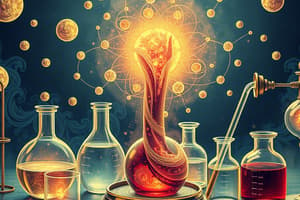Podcast
Questions and Answers
Which concept helps chemists understand the spontaneity and efficiency of chemical reactions?
Which concept helps chemists understand the spontaneity and efficiency of chemical reactions?
- Equilibrium constant
- Entropy
- Enthalpy
- Free energy (correct)
What does stoichiometry focus on in chemistry?
What does stoichiometry focus on in chemistry?
- Balancing chemical equations (correct)
- Atomic structure
- Molecular bonding
- Calculating reaction rates
In chemistry, what do chemists study to gain insight into the relationships between reactants and products?
In chemistry, what do chemists study to gain insight into the relationships between reactants and products?
- Equilibrium constant
- Entropy
- Free energy (correct)
- Enthalpy
What does thermodynamics help chemists understand about chemical reactions?
What does thermodynamics help chemists understand about chemical reactions?
What does atomic structure contribute to in chemistry?
What does atomic structure contribute to in chemistry?
What does atomic structure refer to?
What does atomic structure refer to?
Which type of bond is characterized by the sharing of electrons between atoms?
Which type of bond is characterized by the sharing of electrons between atoms?
What do chemical reactions involve?
What do chemical reactions involve?
What does thermodynamics primarily deal with in chemistry?
What does thermodynamics primarily deal with in chemistry?
What aspect of chemistry involves the calculation of reactants and products in a chemical reaction?
What aspect of chemistry involves the calculation of reactants and products in a chemical reaction?
In which type of bond do atoms transfer electrons to form ions?
In which type of bond do atoms transfer electrons to form ions?
Study Notes
Introduction
Chem 104, often referred to as General Chemistry II with Lab, is a crucial part of a student's journey through the field of chemistry. This course builds upon the foundational knowledge gained during the first term, delving deeper into various aspects of chemistry. Some of the key topics covered in Chem 104 include molecular bonding, atomic structure, chemical reactions, thermodynamics, and stoichiometry. Let's explore each of these topics in detail.
Atomic Structure
Atomic structure refers to the arrangement of protons, neutrons, and electrons within an atom. Understanding the atomic structure helps us understand the properties of elements and their role in forming compounds.
Molecular Bonding
Molecular bonding is the interaction between atoms, leading to the formation of molecules. There are three main types of bonds: covalent, ionic, and metallic. Each type of bond is characterized by its strength and the nature of the interaction between the atoms involved.
Chemical Reactions
Chemical reactions involve the transformation of substances from one state or composition to another. These transformations follow certain rules, such as conservation of mass and energy. By studying chemical reactions, students learn about the processes that govern the behavior of matter and the formation of new substances.
Thermodynamics
Thermodynamics deals with heat and temperature, and how they affect chemical reactions. It includes concepts such as enthalpy, entropy, free energy, and equilibrium constant. Understanding thermodynamics provides insight into the spontaneity and efficiency of chemical reactions, helping chemists design new materials and processes.
Stoichiometry
Stoichiometry is the branch of chemistry concerned with the relationships between the quantities of reactants and products in a balanced chemical equation. It involves calculating the moles and masses of reactants and products, understanding how to balance equations, and applying these principles to various scenarios.
In summary, Chem 104 offers an engaging and comprehensive exploration of core chemistry concepts. Through discussions on atomic structure, molecular bonding, chemical reactions, thermodynamics, and stoichiometry, students gain a solid foundation in the fundamental principles of chemistry.
Studying That Suits You
Use AI to generate personalized quizzes and flashcards to suit your learning preferences.
Description
Explore the fundamental topics covered in Chem 104, including atomic structure, molecular bonding, chemical reactions, thermodynamics, and stoichiometry. Gain a deeper understanding of these core chemistry concepts and their importance in the field of chemistry.




